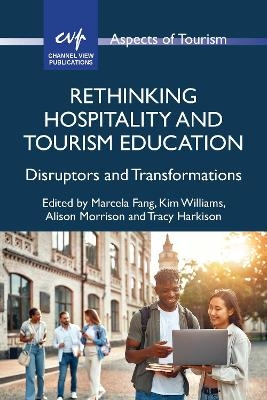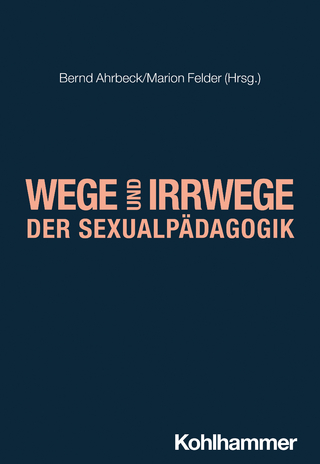
Rethinking Hospitality and Tourism Education
Channel View Publications (Verlag)
978-1-84541-942-4 (ISBN)
- Noch nicht erschienen (ca. März 2025)
- Versandkostenfrei
- Auch auf Rechnung
- Artikel merken
This book offers empirical research, case studies and examples of best practice that address cutting-edge and contemporary higher education issues. It aims to inspire hospitality and tourism educators and scholars to embrace transformative learning approaches that promote student-centred learning in times of rapid change. The chapters explore transformative learning practices in hospitality and tourism education while disclosing innovative and transformative approaches to teaching and learning that respond to the changing needs and demands of both students and industry. The book advances the ongoing discussions and innovations in hospitality and tourism education and informs current and future research and practice. Its focus on digital technology and a range of innovative pedagogy for teaching and learning methods provides a practical, engaging and essential toolkit for teachers and learners.
Chapter 16 will be free to download as an open access publication. We will link to it here as soon as it is available.
Marcela Fang is a Senior Lecturer at William Angliss Institute, Melbourne, Australia. Kim Williams is an Academic Consultant in Education and Innovation, Melbourne, Australia. Alison Morrison is a Professor and Associate Dean of Research at William Angliss Institute, Melbourne, Australia. Tracy Harkison is an Associate Professor at Auckland University of Technology, Auckland, New Zealand/Aotearoa.
Karen A. Smith: Foreword
Chapter 1. Tracy Harkison: Introduction
Part 1: Disruptors and Transformations
Chapter 2. Alison Morrison: Hospitality and Tourism Education: Context Conditions
Chapter 3. Nazia Ali and Birte Schmitz: Transformative Learning in Hospitality and Tourism: From Critical Pedagogy to Critical Digital Pedagogy
Chapter 4. Alicia Orea-Giner and Prachi Thakur: Using Feminist Approaches to Foster Mental Wellbeing in Hospitality Classrooms
Chapter 5. Kim Williams: Academic Integrity: A Discourse Concerning Contract Cheating
Chapter 6. Ajay Khatter and Andrew Dolphin: Artificial Intelligence (AI) and the Traditional Classroom Model: Collaborative Integration for Enhanced Learning
Part 2: Design and Approaches
Chapter 7. Olga Junek and Colin Drake: Run With It, Not Against It: Assessment Re(design) in Tourism, Hospitality and Events Studies Using GenAI.
Chapter 8. Ana Delevska, Esha Thukral, Van K. Nguyen and Sandra Cherro Osorio: The 'House of Lean': Design and Application of Lean Higher Education Practices to Improve Student Outcomes
Chapter 9. Macmillion Fernandes, Inga Mons, Marte Rinck de Boer and Hanneke Assen: Unleashing the Power of Trialogical Learning in Hospitality Education
Chapter 10. Karen Radcliffe and Janine Priest: Designing Authentic Assessments for Event Management Students: Developing Sustainable Communities and Enhancing Social Awareness
Chapter 11. Alexandra Constantinescu and Lisa Wyld: Authentic Assessment Design for Hospitality Studies: An Investigative Case Study Approach
Chapter 12. Prachi Thakur, Anita Manfreda and Isabella Qing Ye: Playful Pedagogy and Gamification: Developing Reflective Practitioners in Tourism and Hospitality Education
Chapter 13. Zdenka Gabrielova, Marcela Fang and Kijung Choi: Evaluating the Effectiveness of Student Collaboration: A Critical Reflection from Three Case Studies
Chapter 14. Emma Delaney and Mark Ashton: Using Attendance Monitoring as a Wellbeing Intervention Tool to Ensure Engagement with Experiential Learning
Chapter 15. George Skell, Amanda Ting, Francisco Navarrete Garces, Mona Yang and Antoine Bisson: The Rise of Pop-Up Restaurants: An Innovative Approach to Teaching Food and Beverage Management to Hospitality Students
Chapter 16. Irina N. Pericin Häfliger: Transforming Teaching Practice into Blended Learning: A Case Study on the Role of Values and Influence
Chapter 17. Paul C. Strickland: Immersive Learning Through Study Tours: A Case Study of Vietnam
Part 3: Curricula Implications
Chapter 18. Jeroen A. Oskam and Anna de Visser-Amundson: A Design-Based Research Inspired Curriculum to Prepare Hospitality Students for Times of Uncertainty
Chapter 19. Mairead McEntee, Victoria McCollum and Una McMahon-Beattie: You’re Going to Need a Bigger Boat (or Curriculum)
Chapter 20. Thanh Le Minh and Marcela Fang: Developing Executive Leadership Capacity in Hospitality Graduate Students through Work-Integrated Learning in Vietnam
Chapter 21. Samantha Boom: Educating the Future Women Leaders of the Hospitality Industry
Chapter 22. Valentyna Stolyarchuk: Fishbowl Discussion as a Methodological Tool for Hospitality and Tourism Education
Chapter 23. Emma O’Brien and Gavan Cleary: What’s the Big Idea? Using Blended Learning Approaches to Support the Development of Entrepreneurial Competencies in Tourism and Hospitality Education
Chapter 24. Tracy Harkison: Conclusion
| Erscheint lt. Verlag | 11.3.2025 |
|---|---|
| Reihe/Serie | Aspects of Tourism |
| Verlagsort | Bristol |
| Sprache | englisch |
| Maße | 156 x 234 mm |
| Themenwelt | Sozialwissenschaften ► Pädagogik |
| Wirtschaft | |
| ISBN-10 | 1-84541-942-1 / 1845419421 |
| ISBN-13 | 978-1-84541-942-4 / 9781845419424 |
| Zustand | Neuware |
| Informationen gemäß Produktsicherheitsverordnung (GPSR) | |
| Haben Sie eine Frage zum Produkt? |
aus dem Bereich


